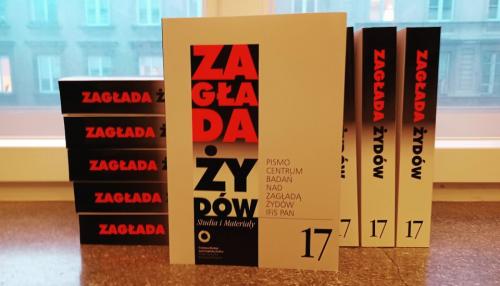EHRI Partner | Call for Articles Journal "Holocaust Studies and Materials 2023"

Zagłada Żydów. Studia i Materiały / Holocaust Studies and Materials 2023
Theme: Settlement in the First Years After the Holocaust: Justice, Revenge, Memory
The Editorial Board of the scholarly yearbook Zaglada Zydow. Studia i Materialy / Holocaust Studies and Materials invites authors to submit article proposals for the 2023 edition, which is dedicated to the post-war Search For Justice, emphasizing the period 1944–1949. Zaglada Zydow. Studia i Materialy is pulished by EHRI's Polish partner, the Polish Center for Holocaust Research Association.
The central theme of Volume 19 (2023) will be the post-war search for justice, emphasizing the period 1944–1949. The group of sources proposed for research consists of the files of prosecution investigations, trials of Nazi criminals and collaborators, social courts, and files of civil courts that adjudicated property matters. Researchers have used these materials for many years but still do not exhaust their potential and enormous size.
Among the questions raised from the analysis are:
- Under what circumstances was the evidence given in courts?
- What was the social and political context?
- Why did some of the people responsible for crimes remain unpunished?
- Were the trials – from today’s perspective – fair? Did they give a sense of justice then?
- Why, in some cases, did people who knew perpetrators decide not to try to seek justice?
It will also be essential to look at the formation of the memory of the Holocaust in the first post-war years, understood as an expression of justice towards the victims.
Contributions are invited from a range of disciplines and perspectives. Suggestions of articles exploring the following key themes will be considered:
- Trials of Nazi criminals and collaborators before special and civil courts. New attempts at reading prosecutor and trial files.
- Witnesses in post-war trials – who they were, how and why they testified. The credibility of the witnesses.
- Search for evidence of a crime. Post-war returns to places of violence. Exhumations.
- Recovery of property in the court.
- Settlements among the survivors. Social courts.
- Testimonies collected in the first post-war years as documentation of genocide.
- Revenge and revenge fantasies. Attempts to administer justice outside the law. Vigilante justice.
- Remembrance or obliteration of memory? The memory of the victims and the perpetrators in the first years after the war. Memory and justice in the Polish and European context.
Read the Call for Articles for more info and how to submit.
